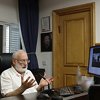 After we enter Egypt, we start working only on our unity. This is our only goal: the Creator should reveal Himself in the center of the group. Therefore, we descend to Egypt realizing how necessary the unity is, but we are absolutely incapable of attaining it. We do not want to go there, but we have no choice because we feel that if we do not go for this connection, there will be famine: we will be left with nothing and will never reach spirituality.
After we enter Egypt, we start working only on our unity. This is our only goal: the Creator should reveal Himself in the center of the group. Therefore, we descend to Egypt realizing how necessary the unity is, but we are absolutely incapable of attaining it. We do not want to go there, but we have no choice because we feel that if we do not go for this connection, there will be famine: we will be left with nothing and will never reach spirituality.
This is all possible due to the connection between Jacob and Joseph. As soon as Jacob finds out that Joseph lives in Egypt, he thinks only about how to meet him.
A typical egoist does not think about unity, he just wants to reveal the Creator, to reach the upper world, to feel eternity, perfection, spiritual attainment, to feel immortal and not like an animal destined to die. Those are the dreams of a small egoist. Egypt, the Pharaoh, need to be added to this small egoistic desire in order to really attain the upper world, that is, the purpose of creation.
This requires adding immense egoism, a lot of properties, to our desire to enjoy, which is why we are forced to descend into Egypt. The Creator organizes this for us, as promised to Abraham, and without it, we would be unable to reach the land of Israel.
The Creator showed Abraham the land of Israel, the desire to receive pleasure completely corrected for bestowal in which the creation is merged with the Creator, the end of correction. Abraham asked if it were possible? Where will such a desire come from? There is neither such a great desire to enjoy nor to bestow corresponding to it. He did not have the three lines, only one, a small illumination from the upper light, which was enough for him.
You can enter the land of Israel only with the three lines. If the left line, the Pharaoh, grows, then the right line will grow accordingly. And by connecting the two lines together, you can reach the land of Israel, the desire fully aimed at bestowing to the Creator.
The Creator told Abraham that He would take care of it, and He brought the whole group of Abraham to the condition called “Egypt” and then led them out and gave the Torah. All this was possible because from the very beginning Abraham had an intention to unite. He thought that this could be done individually.1
Pithom and Ramses are beautiful cities for Pharaoh, but poor and miserable for the people of Israel. Pharaoh and Israel are two opposite poles. I observe from Pharaoh’s side and then from the Creator’s side. If I observe from Pharaoh’s point of view, I see how wonderful my egoistic desire is, which can be enjoyed in my country, Egypt.
If I overcome this egoism, if I do not want to enjoy myself in Egypt but want to rise higher, then I cry out, not to the Pharaoh, but to the Creator, asking for help and salvation. The Creator then elevates me from the state of Pharaoh to another state, and from there I see that everything I have built, these cities, are not at all beautiful, but miserable. I feel no benefit in anything I have done, that is, I have not approached perfection and bestowal at all. Therefore, I cry to the Creator and ask for my correction. Through the feeling of the miserable cities of Pithom and Ramses, the Creator brings me to correction.
I will then see these cities built by me in Egypt differently, in a spiritual form. When I complete these miserable cities with corrections, with the light of Hassadim, building the intention of bestowal upon my desire to enjoy, I will turn all Egypt into the Garden of Eden (paradise). Then, it will not be Egypt, but the land of Israel.2
The exodus from Egypt is an escape, with eyes closed, to unification; this possibility suddenly opens up before us like the Red Sea. I jump into the unity, into the Red Sea, and I cross it. After that, we begin to work consistently on our connection, on mutual guarantee, on our unity: either we unite or this will be our burial place.3
From the 1st part of the Daily Kabbalah Lesson 4/15/19, Pesach (Passover)
From the 1st part of the Daily Kabbalah Lesson 4/15/19, Pesach (Passover)

No comments:
Post a Comment